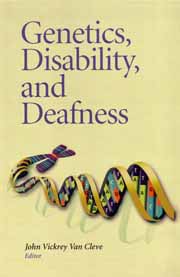John Vickrey Van Cleve, Editor
Now in Paperback!
October 2004
| Table of Contents Excerpt Reviews: Ragged Edge Magazine, Choice, SIGNews, Disability Studies Quarterly |
$46.95 paperback, ebook |
From SIGNews
In the opening essay of Genetics, Disability, and Deafness, Louis Menand writes of “a great battle going on in our intellectual culture today . . . . [a] battle between people who believe that science opens new possibilities for human life and people who worry that it closes them.” In an age of biotechnology, prenatal screening, and genetic manipulation, where everything from anxiety to violent tendencies can supposedly be mapped and reshaped, this “battle” seems less a war between opposing forces than a muddle in which we resist some things and embrace others, depending on our highly personal perspective. Most of us, not surprisingly, want to have our cake and eat it, too.
Scholars and the general public alike will find this volume a useful overview of genetics research specific to deafness, despite its rather broad scope. Culled from an interdisciplinary conference held at Gallaudet University in 2003, the hook is divided into five sections, each with its own brief introduction. Bringing together humanism, science, literature, and history together in a single book poses risks, but Van Cleve has done an admirable job of threading the various pieces together into a whole. As he reminds us in the introduction, the “variability of disability— in physical expression, in cultural meaning, and as lived experience” is a gift to be valued, not purged, in contemporary society. All the essayists in this book possess a shared respect for the limitations as well as the advantages of science. But the volume of essays, which attempts to cover such large territory invariably, suffers from imbalance. One wonders, for example, why the editor chose to include Mark Willis’ “Not This Pig: Dignity, Imagination and Informed Consent,” which has nothing to do with deafness.
At the heart of the book lies two extremely useful sections devoted to genetics research in deafness and its uses, in particular the discovery and mapping of connexin 26, a tiny gene which holds the honor of being the predominant cause of genetic, prelingual deafness. “The Epidemiology of Hereditary Deafness” is one of the essays, written by prominent geneticist Walter E. Nance. In his examination of early studies of genetic deafness— in particular the work of Gallaudet College professor and researcher Edward Allen Fay in the late nineteenth-century— Nance hypothesizes that connexin deafness has increased over time in tandem with the growth of the deaf community. Deaf people, Nance dryly points out, are rather frequently inclined to marry other deaf people. His study points to a doubling of the deaf population over the past 200 years.
A cautionary approach to contemporary thinking about disabilities and the rights of deaf and disabled individuals illuminates the work’s final essay by Michael Bérubé, who argues for an experiential, value-laden approach to crossing off the shoulds and should-nots of genetic science. Conflict arises when public policy and private desires clash, and Bérubé’s conclusion is that there is no such thing as a truly “private realm” when it comes to disability.
The book’s weakness is also its strength. It is an invaluable compendium for anyone wishing to have a finer grasp of the overall direction of genetics research, and this direction is troubled by both the promise and peril of scientific advancement. The flux posed by Bérubé is at odds with the certainty of scientists like Nance, whose unerring faith in logic leads him to boldly declare that “more than any other specialty in medicine, [genetics] allows you to understand the past and predict the future.” The most instructive lesson of Genetics, Disability, and Deafness, finally, is that while we might be able to learn from the past and plan the future, what we haven’t quite figured out yet is what to do about the present.
John Vickrey Van Cleve is Professor Emeritus of History at Gallaudet University.
Paperback
ISBN 978-1-56368-576-7
6 x 9, 240 pages, tables, figures, photographs, references, index
$46.95
Ebook
ISBN 978-1-56368-279-7
$46.95
